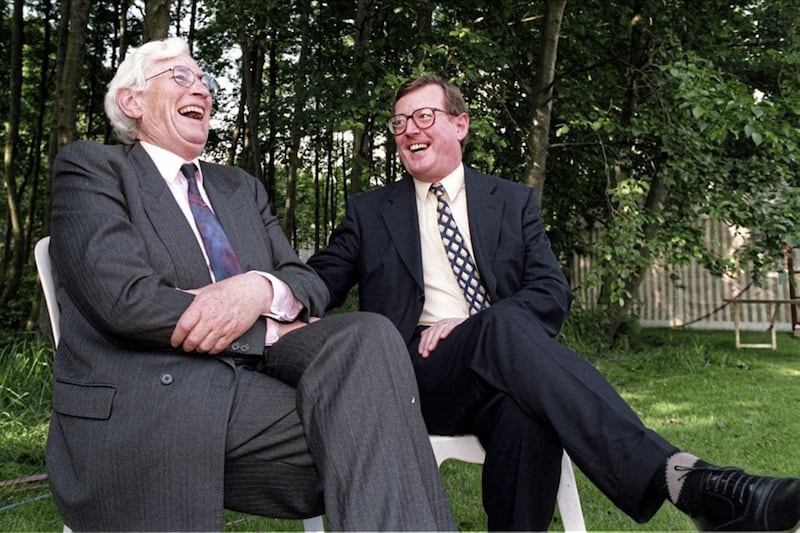While uncertainty about the future direction of unionism is nothing new, the pessimistic tone of the messages sent out by Doug Beattie and Edwin Poots over recent weeks has been particularly striking.
Mr Beattie’s statement after resigning as Ulster Unionist leader gave a clear indication that he felt incapable of reforming his party, and Mr Poots signalled the need for a fundamentally different approach from the DUP, which he said could no longer rely solely on the support of “white, working class, Protestants”.
The Ulster Unionist Party tends to have a high turnover of leaders, but Mr Beattie’s position was regarded as reasonably secure after regaining the big prize of a Westminster seat in South Antrim in July’s UK general election, while also coming within 2,000 votes of adding an unlikely second in East Antrim and polling respectably in Lagan Valley.
However, he presided over disappointing performances almost everywhere else, and, with party officers seemingly resisting his attempts to move towards the centre ground, eventually decided it was time to stand down.
His successor will be expected to come from the Ulster Unionist Assembly group, but it is all male, leaning towards veteran status and, apart from Mr Beattie, includes three former leaders and five other MLAs who do not enjoy a high profile outside their own constituencies.

It appears that the party, whoever takes over, will continue to effectively promote itself on the basis that it is not the DUP, which is hardly a long term strategy for returning to its former role as the main force in Stormont politics.
The DUP, for its part, was hugely relieved when its leader, Gavin Robinson, narrowly managed to retain his East Belfast seat last month in the face of a strong challenge from his Alliance counterpart, Naomi Long, but many of its other results were alarming.
Although the loss of Lagan Valley, after the high profile departure of Jeffrey Donaldson, was always a danger, senior MPs like Sammy Wilson in East Antrim and Gregory Campbell in East Derry came much closer to defeat than almost anyone predicted.
The major DUP casualty was of course Ian Paisley, ousted from the North Antrim constituency which he and his late father had held between them for the last 54 years by his nemesis, Jim Allister of the Traditional Unionist Voice.
Mr Allister’s triumph was an outlier, as it was the only case of the DUP being outflanked on its right wing, with the verdict from ballot boxes elsewhere prompting close scrutiny at party HQ and almost certainly explaining the much discussed intervention by the Stormont speaker and former party leader, Mr Poots.
He used language not usually associated with the DUP during his BBC interview when he spoke of the necessity to reach out beyond its traditional base for votes, and said those who support a “very pure interpretation of unionism” are those most likely to lose the union.
Mr Poots specifically referred to working with “people from other communities who have come to live here”, although his new target audience may not forget that other prominent DUP voices have offered much more equivocal thoughts on the benefits of multi-culturalism.
All sides can offer their own interpretation of electoral patterns and demographic trends, but the firm evidence is that confidence in one camp is not running at a high level
His comments were also a rare example of a senior DUP figure openly discussing the prospect that the union could be lost, even though he insisted he did not believe there would be a united Ireland in his lifetime.
It would not normally be appropriate to discuss the mortality of a politician, but, as the vastly experienced Mr Poots brought up the subject, it is valid to point out that he is in his 60th year and will be aware that the average male life expectancy in the UK is 80.
The timescale he suggested can be regarded as casting doubt on the idea that the union could survive much further than another 20 years, at a stage when pressure for a border referendum is already growing steadily.
Many supporters of unity are convinced that their aim can be democratically secured within a decade, so it could be argued that the difference between nationalists and unionists on the constitutional question is coming down to a period of possibly 10 years.
All sides can offer their own interpretation of electoral patterns and demographic trends, but the firm evidence is that confidence in one camp is not running at a high level.
When we find the outgoing leader of the Ulster Unionists implying that his party is almost beyond redemption, and a key DUP representative prioritising migrant voters if the union is to be saved, we are plainly entering unusual territory.









